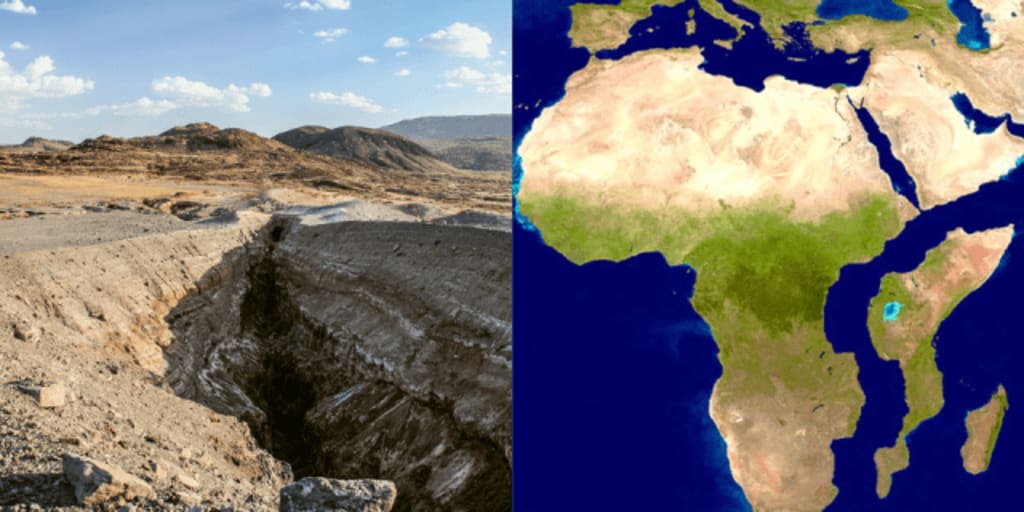
Africa is splitting. This may sound like a bold statement, but it is true. The African continent is gradually tearing apart, and the process is known as continental rifting. This phenomenon is the result of the tectonic activity that is causing the African Plate to split into two separate plates. The process is slow, but it is significant and has the potential to change the face of the African continent as we know it.
The process of continental rifting occurs when the Earth's lithosphere, which is the outermost layer of the Earth's crust, begins to stretch and thin. This stretching and thinning lead to the formation of deep cracks, called rift valleys, that run perpendicular to the direction of the stretching. Over time, these rift valleys deepen and widen until they eventually become large enough to form a new ocean basin.
The African continent is located on top of the African Plate, which is one of the Earth's major tectonic plates. This plate is surrounded by other plates, including the Eurasian Plate, the Arabian Plate, and the Indian Plate. The African Plate is slowly moving away from these other plates, and as it does, it is stretching and thinning.
The East African Rift Valley is one of the most visible and dramatic examples of this process. The valley stretches over 3,000 kilometers (1,864 miles) from the Gulf of Aden in the north to Zimbabwe in the south. The rift valley is a series of deep and narrow lakes that are formed by the gradual pulling apart of the African Plate. The valley is still growing, and scientists predict that it will eventually become a new ocean basin.
The process of continental rifting is not new. It has been happening for millions of years and has shaped the Earth's continents in many ways. The Atlantic Ocean, for example, was formed by the splitting of the supercontinent Pangaea, which began around 200 million years ago.
The splitting of Africa has many implications. First, it will create new land masses and ocean basins. These new features will have a significant impact on the Earth's climate, ocean currents, and biodiversity. They may also provide new opportunities for economic development, such as fishing and mineral extraction.
Second, the splitting of Africa could lead to significant geological activity, such as earthquakes and volcanic eruptions. The East African Rift Valley is already one of the most seismically active regions in the world, and as the rift valley continues to grow, it could become even more unstable.
Finally, the splitting of Africa has significant cultural and historical implications. The rift valley is home to some of the world's oldest human fossils, including the famous Lucy skeleton. The splitting of Africa could change the way we understand human evolution and migration patterns.
In conclusion, the splitting of Africa is a significant geological process that has the potential to shape the continent in many ways. While the process is slow and gradual, it is also significant and has the potential to create new land masses, ocean basins, and geological activity. As the process continues, scientists and researchers will be watching closely to see how it unfolds and what impact it will have on the African continent and the world.
What will happen after spiltting:
After the splitting of the African continent, several significant changes will occur in the geological, biological, and environmental aspects. One of the most significant changes will be the creation of a new ocean basin, which will form as the rift valley continues to widen and deepen. This new ocean basin could significantly alter the Earth's climate and ocean currents, leading to changes in weather patterns, sea levels, and ocean temperatures.
The splitting of Africa will also create new land masses, which will provide new habitats for various species of plants and animals. This will result in the development of new ecosystems and biodiversity in the region. However, the process of creating new land masses will also cause the displacement of some species, and their survival could be threatened.
Another impact of the splitting of Africa is the potential for increased geological activity, such as earthquakes and volcanic eruptions. The East African Rift Valley is already known to be a seismically active region, and the splitting of the continent could further exacerbate this. This could lead to significant challenges in terms of disaster management and mitigation.
The splitting of Africa could also have significant economic implications. The new ocean basin could provide new opportunities for fishing and mineral extraction, which could boost the economies of countries in the region. However, it could also lead to conflicts over resources, and the potential exploitation of these resources could have negative impacts on the environment.
Finally, the splitting of Africa has significant cultural and historical implications. The East African Rift Valley is home to some of the world's oldest human fossils, which have provided critical insights into human evolution and migration patterns. The creation of new land masses and the displacement of species could result in the loss of cultural and historical sites, further impacting the region's identity and cultural heritage.
In conclusion, the splitting of Africa is a significant geological process that will have far-reaching impacts on the continent's environment, biology, geology, and culture. While these impacts are still uncertain, it is clear that they will be significant and will require careful monitoring and management to ensure that they are positive rather than negative.
About the Creator
Judith
I am a housewife with a passion for writing and a talent for creating interesting articles. With my talent for writing and my passion for sharing, I will sure to become one of your favorite article creators.






Comments
There are no comments for this story
Be the first to respond and start the conversation.